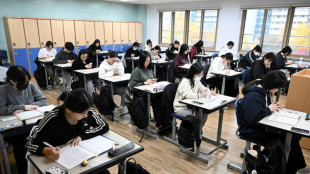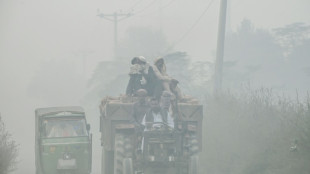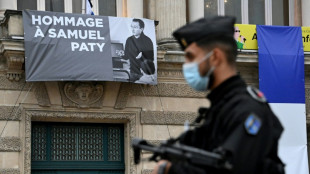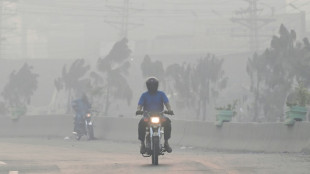
-
 German Greens' Robert Habeck to lead bruised party into elections
German Greens' Robert Habeck to lead bruised party into elections
-
Johnson bags five as Australia beat Pakistan to seal T20 series

-
 Zelensky says wants to end war by diplomacy next year
Zelensky says wants to end war by diplomacy next year
-
Rugby Union: Wales v Australia - three talking points

-
 10 newborns killed in India hospital fire
10 newborns killed in India hospital fire
-
Veteran Le Cam leads Vendee Globe as Sorel is first to quit

-
 Bagnaia on pole for Barcelona MotoGP, Martin fourth
Bagnaia on pole for Barcelona MotoGP, Martin fourth
-
UN climate chief urges G20 to spur tense COP29 negotiations

-
 Rauf takes four as Pakistan hold Australia to 147-9 in 2nd T20
Rauf takes four as Pakistan hold Australia to 147-9 in 2nd T20
-
World not listening to us, laments Kenyan climate scientist at COP29

-
 Wales take on Australia desperate for victory to avoid unwanted record
Wales take on Australia desperate for victory to avoid unwanted record
-
Tyson beaten by Youtuber Paul in heavyweight return

-
 Taylor holds off bloodied Serrano to retain undisputed crown
Taylor holds off bloodied Serrano to retain undisputed crown
-
Japan PM expresses concern to Xi over South China Sea situation

-
 Hoilett gives Canada win in Suriname as Mexico lose to Honduras
Hoilett gives Canada win in Suriname as Mexico lose to Honduras
-
Davis, James spark Lakers over Spurs while Cavs stay perfect

-
 Mushroom houses for Gaza? Arab designers offer home-grown innovations
Mushroom houses for Gaza? Arab designers offer home-grown innovations
-
Gabon votes on new constitution hailed by junta as 'turning point'

-
 Young Libyans gear up for their first ever election
Young Libyans gear up for their first ever election
-
Vice tightens around remaining civilians in eastern Ukraine

-
 Dutch coalition survives political turmoil after minister's resignation
Dutch coalition survives political turmoil after minister's resignation
-
Uruguay end winless run with dramatic late win over Colombia

-
 Max potential: 10 years since a teenage Verstappen wowed in Macau
Max potential: 10 years since a teenage Verstappen wowed in Macau
-
Tens of thousands flee as Typhoon Man-yi nears Philippines

-
 Is Argentina's Milei on brink of leaving Paris climate accord?
Is Argentina's Milei on brink of leaving Paris climate accord?
-
Big Bang: Trump and Musk could redefine US space strategy

-
 Revolution over but more protests than ever in Bangladesh
Revolution over but more protests than ever in Bangladesh
-
Minister resigns but Dutch coalition remains in place

-
 Ireland won 'ugly', says relieved Farrell
Ireland won 'ugly', says relieved Farrell
-
Stirring 'haka' dance disrupts New Zealand's parliament

-
 England's Hull grabs lead over No.1 Korda at LPGA Annika
England's Hull grabs lead over No.1 Korda at LPGA Annika
-
Kosovo players walk off in Romania game after 'Serbia' chants

-
 Lame-duck Biden tries to reassure allies as Trump looms
Lame-duck Biden tries to reassure allies as Trump looms
-
Nervy Irish edge Argentina in Test nailbiter

-
 Ronaldo at double as Portugal reach Nations League quarters, Spain win
Ronaldo at double as Portugal reach Nations League quarters, Spain win
-
Fitch upgrades Argentina debt rating amid economic pain

-
 Trump picks Doug Burgum as energy czar in new administration
Trump picks Doug Burgum as energy czar in new administration
-
Phone documentary details struggles of Afghan women under Taliban

-
 Ronaldo shines as Portugal rout Poland to reach Nations League last-eight
Ronaldo shines as Portugal rout Poland to reach Nations League last-eight
-
Spain beat Denmark to seal Nations League group win

-
 Former AFCON champions Ghana bow out as minnows Comoros qualify
Former AFCON champions Ghana bow out as minnows Comoros qualify
-
Poland, Britain reach BJK Cup quarter-finals

-
 At summit under Trump shadow, Xi and Biden signal turbulence ahead
At summit under Trump shadow, Xi and Biden signal turbulence ahead
-
Lebanon said studying US truce plan for Israel-Hezbollah war

-
 Nigerian UN nurse escapes jihadist kidnappers after six years
Nigerian UN nurse escapes jihadist kidnappers after six years
-
George tells England to prepare for rugby 'war' against Springboks

-
 Pogba's Juve contract terminated despite doping ban reduction
Pogba's Juve contract terminated despite doping ban reduction
-
Michael Johnson's Grand Slam Track series to have LA final

-
 Kagiyama, Yoshida put Japan on top at Finland Grand Prix
Kagiyama, Yoshida put Japan on top at Finland Grand Prix
-
Alcaraz eyeing triumphant Davis Cup farewell for Nadal after ATP Finals exit


Black hair, white shoelaces: Japan school rules under fire
Every school has its rules, but tough regulations at some Japanese institutions, mandating everything from black hair to white shoelaces, are facing increasing criticism and even legal action.
Toshiyuki Kusumoto, a father of two in western Japan's Oita, is seeking court intervention to protect his younger son from regulations he calls "unreasonable".
They include rules on hair length, a ban on styles including ponytails and braids, prohibition of low-cut socks and a stipulation that shoelaces be white.
"These kinds of school rules go against respect for individual freedom and human rights, which are guaranteed by the constitution," Kusumoto told AFP.
Later this month, he will enter court-mediated arbitration with the school and city, hoping authorities will revise the rules.
Change is already under way in Tokyo, which recently announced that strict rules on issues such as hair colour will be scrapped at public schools in the capital from April.
But elsewhere, the rules are fairly common and Kusumoto, who recalls chafing at similar restrictions as a child, hopes his legal action will bring broader change.
"It's not only about our children. There are many other children across Japan who are suffering because of unreasonable rules," he said.
Such regulations, which generally come into force when children enter middle school at around age 12, emerged after the 1970s, according to Takashi Otsu, an associate professor of education at Mukogawa Women's University.
- Rules 'destroyed a student's life' -
At the time, "violence against teachers became a social problem, with schools trying to control the situation through rules", he told AFP.
"Some kinds of rules are necessary for any organisation, including schools, but decisions on them should be made with transparency and ideally involving students, which would allow children to learn democratic decision-making," he said.
The array of regulations has been defended as helping ensure order and unity in the classroom, but there have been other challenges.
In 2017, an 18-year-old high-school girl who was repeatedly ordered to dye her naturally brown hair black filed a lawsuit in Osaka seeking compensation of 2.2 million yen ($19,130) for psychological suffering.
The case made national headlines and eventually led to the government last year instructing education boards to examine whether school rules reflect "realities around students".
But in a sign of the difficult debate over the subject, both Osaka's district and appeals courts ruled schools could require students to dye their hair black within their discretion for "various educational" purposes.
The student said she was regularly harassed over the issue even though she was colouring her hair to meet the requirements, according to her lawyer.
"This rule destroyed a student's life," he told AFP, speaking on condition of anonymity to protect his client's identity.
The student, now 22, has not given up though, and in November appealed to the supreme court.
- 'Recipe for unthinking children' -
There are other signs of pressure to change the rules, including a petition submitted to the education ministry in January by teen members of rights group Voice Up Japan.
They want the ministry to encourage schools to work with students on discussing rule changes.
"We started this campaign because some of our members have had unpleasant experiences with school rules," said 16-year-old Hatsune Sawada, a member of Voice Up Japan's high-school division.
The petition gives the example of a girl who was humiliated by a teacher for growing a fringe that, when flattened with a hand, covered the girl's eyebrows -- a violation of the rules.
In Oita, the rules also include school uniforms designated by gender, with trousers only for boys and skirts for girls.
The local education board says the rules "not only nurture a sense of unity among children but also ease the economic burden for families of buying clothes".
But Kusumoto disagrees.
"A sense of unity is not something that is imposed, it's something that should be generated spontaneously," he said.
Imposing these kinds of rules "is a recipe for producing children who stop thinking".
P.Serra--PC




